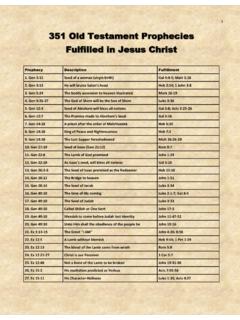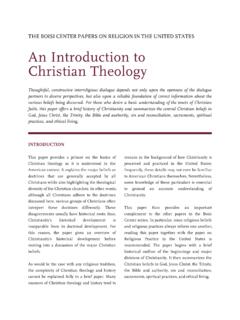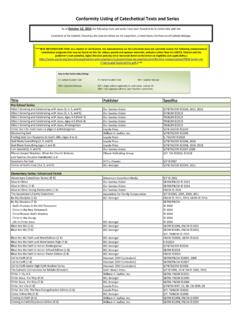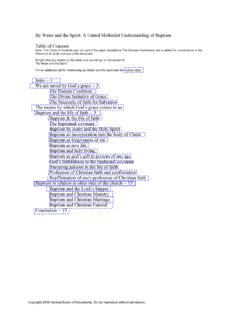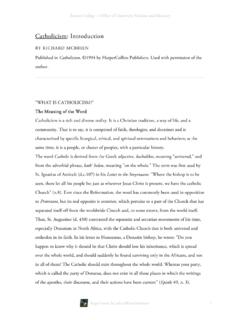Transcription of Introduction - New Testament
1 Acts of the Apostles by David Webb 2013 1 Table of Contexts Overview and Introduction .. 2 Lesson 1 Acts 1:1-47 .. 10 Lesson 2 Acts 2:1-47 .. 17 Lesson 3 Acts 3:1-26 .. 26 Lesson 4 Acts 4:1-37 .. 35 Lesson 5 Acts 5:1-42 .. 43 Lesson 6 Acts 6:1-15 .. 53 Lesson 7 Acts 7:1-60 .. 58 Lesson 8 Acts 8:1-40 .. 68 Lesson 9 Acts 9:1-43 .. 79 Lesson 10 Acts 10:1-48 .. 93 Lesson 11 Acts 11:1-30 .. 103 Lesson 12 Acts 12:1-25 .. 113 Lesson 13 Acts 13:1 14:28 .. 121 Lesson 14 Acts 15:1-29 .. 130 Lesson 15 Acts 15:30 17:14 .. 138 Lesson 16 Acts 17:15 18:22 .. 150 Lesson 17 Acts 18:23 19:41 .. 160 Lesson 18 Acts 20:1 21:16 .. 169 Lesson 19 Acts 21:17 23:35 .. 178 Lesson 20 Acts 24:1 25:27.
2 186 Lesson 21 Acts 26:1-32 .. 194 Lesson 22 Acts 27:1-44 .. 202 Lesson 23 Acts 28:1-31 .. 210 Addendum: Timeline of the Apostle Paul .. 218 Acts of the Apostles by David Webb 2013 2 Acts of the Apostles A Study of New Testament History Overview Introduction : The Name: The book is most commonly called "The Acts of the Apostles," although it is quite probable that, in its original form, it had no title at all. Over the centuries it has been called simply "Acts," or "The Acts" (Eusebius). This title "The Acts of the Apostles" is somewhat misleading since only a few of the apostles of Jesus Christ are mentioned, with special emphasis given to the "acts" of Peter and Paul. Therefore, it covers a time-span of approximately 32 years from the ascension of Jesus Christ (ca.)
3 AD 30) to Paul's imprisonment in Rome (ca. AD 68). Some have suggested a more appropriate title would be "The Acts of the Holy Spirit," since the presence and work of the Holy Spirit is central to the book beginning on Pentecost (Acts 2). The Author: Although the author does not identify himself by name, scholars have ascribed the authorship of Gospel of Luke and the book of Acts to Luke, the companion of Paul. One reason for concluding both books came from the same author is that both were addressed to the same individual, Theophilus, a distinguished Gentile: Inasmuch as many have taken in hand to set in order a narrative of those things which have been fulfilled among us, just as those who from the beginning were eyewitnesses and ministers of the word delivered them to us, it seemed good to me also, having had perfect understanding of all things from the very first, to write to you an orderly account, most excellent Theophilus, that you may know the certainty of those things in which you were instructed.
4 (Luke 1:1-4) The former account I made, O Theophilus, of all that Jesus began both to do and teach, until the day in which He was taken up, after He through the Holy Spirit had given commandments to the apostles whom He had chosen, to whom He also presented Himself alive after His suffering by many infallible proofs, being seen by them during forty days and speaking of the things pertaining to the kingdom of God. (Acts 1:1-3) Furthermore, the literary style, vocabulary, and theological contents of Acts and the Gospel of Luke are quite similar. The numerous references to "we" (Acts 16:10-17; 20:5 21:18; 27:1 28:16) indicate Luke had joined Paul as a fellow traveling companion and reliable historian. Since he was present and personally familiar with many of the events surrounding Paul's latter missionary journeys, Luke was able to write with greater clarity and vividness in the latter half of Acts.
5 He was an eyewitness to many of these events. Luke also mentioned 95 different persons from 32 countries, 54 cities, and 9 Mediterranean islands in Acts. It has been suggested that he may have gathered Acts of the Apostles by David Webb 2013 3 information for the first part of Acts (chapters 1 12), and for the gospel bearing his name, from many these sources. In Acts, however, Luke writes a very selective history, focusing only on the spread of the gospel from Jerusalem to Rome. The Date: It is difficult to determine the actual date of the writing of Acts. The only thing that can be said with any certainty is that it was written after the Gospel of Luke, and before the final events in the life of the apostle Paul is played out.
6 Many scholars date Acts as early as AD 62 and as late as AD 68 or a little later, since it concludes with the account of Paul's imprisonment and his earliest ministry in Rome. The Theme: The book Acts has been described like a drama with two main characters, Peter and Paul. The theme deals with the spread of the gospel from Jerusalem (the city where Jesus was crucified) to Rome, the capital of the Roman Empire, and provides valuable information concerning the development of the early church following the ascension of Jesus. Standing between the Gospels and the Epistles, the book of Acts is a bridge between the life of Jesus and the ministry of the apostle Paul. Since the book of Acts is the continuation of the gospel account of all Jesus "began to do and teach," it catalogs what Jesus continued to do and teach through the Holy Spirit sent down from heaven.
7 In fact, the principle theme of Acts is outlined by Jesus Himself: "But you shall receive power when the Holy Spirit has come upon you; and you shall be witnesses to Me in Jerusalem, and in all Judea and Samaria, and to the end of the earth." (Acts 1:8) Essentially, the theme of Acts focuses on the spread of the gospel from Jerusalem, to Judea and Samaria, and eventually the world of that day or from a gospel given to the "Jews first" (chapters 2 9) and then to "the Gentiles" (chapters 10 26). But in providing a historical record of the establishment of the church and the spread of the gospel, Luke also defended "the W ay" (Acts 9:2) from the suspicion of it being some kind of secret, subversive cult (Acts 26:26). Perhaps this is why so many public speeches are recorded in Acts so that no one could claim the message of the apostles was secretive and given to only a select few.
8 Furthermore, Luke showed that the apostles were not leading sedition against Rome. Time after time Luke recorded that the Roman authorities acquitted the apostles of the charges brought against them (Acts 16:38-39; 17:5-9; 18:12-17; 19:35-41; 23:23-30; 25:23-27; 26:28-31). This may be the reason for Luke devoting nearly one third of Acts (chapters 21 28) to Paul's imprisonment to not only show the gospel reached its destination despite numerous obstacles, but also to show that Paul and his message were not politically subversive. Theological Contribution: The book of Acts could just as easily be titled; "The Acts of the Holy Spirit," for the Spirit is mentioned nearly 60 times in the book. In His parting words, Jesus reminded His disciples of the promise of the Father that "you shall be baptized with the Holy Spirit not many days from now" and be empowered to proclaim the message of the gospel by the divine inspiration of the Spirit.
9 Ten days later the Acts of the Apostles by David Webb 2013 4 power of the Spirit descended on the apostles at Pentecost (2:1-4). Persons "from every nation under heaven" (2:5) saw the miraculous demonstrations of the Holy Spirit's power "the wonderful works of God" (2:11) and heard the divinely inspired message proving beyond any doubt that Jesus was the Christ, the Son of the living God. Thus, the Lord's church was born with the baptism of three thousand souls on that same day. Beginning with the conversion of three thousand on Pentecost, the book of Acts contains a total of seven specific examples of conversions (Acts 2:14-47; 8:5-13; 26-39; 9:1-18; 10:34-48; 16:14-15; 25-34) in which the gospel was proclaimed and those who were receptive to the message were all baptized into Christ.
10 From these seven examples we have the complete picture of all the steps leading to salvation by grace through faith. Acts also contains portraits of many Christians of the early church and the outstanding characteristics of each. For example, Barnabas exemplified generosity (4:36-37), Stephen modeled forgiveness (7:60), Philip demonstrated dedication to others (6:1-5; 8:26); Paul typified humble obedience (26:19); and Cornelius exhibited deep devotion to God (10:2); all the apostles demonstrated great boldness (2:29; 4:13, 29, 31; 28:31). In fact, ordinary people were empowered to perform extraordinary feats: a cowardly apostle was empowered to address multitudes (2:14) and made a defense before the betrayers and murders of Jesus (4:8); a servant defended his faith to the point of death (7:58); the despised Samaritans turned to Christ (8:4-8); so did a Gentile Centurion (10); a staunch persecutor of the gospel was converted (9:1-19), and through him the gospel reached the capital of the world!

